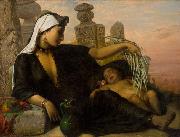China al por mayor de Marco de Oleo |
|||||||||||

|
|||||||||||
|
|
|
||||||||||||||
|
Elisabeth Jerichau Baumann
(born November 21, 1819 - died July 11, 1881 in Copenhagen) was a Polish-born Danish painter. She was married to the sculptor Jens Adolf Jerichau. Elisabeth Jerichau-Baumann was born in Zoliborz (Jolibord) a borough of Warsaw.Her father Philip Adolph Baumann (1776 - 1863), a mapmaker, and her mother, Johanne Frederikke Reyer (1790 - 1854), were German. At the age of nineteen, she began her studies in Desseldorf which at the time was one of the most important art centres in Europe and her early subject matter was drawn from Slovak life. She began exhibiting there and in 1844 attracted public attention for the first time. After she moved to Rome, her paintings were primarily of local life. It was here that she met her future husband, Jens Adolf Jerichau, whom she married in 1846. When the artist couple was not travelling, she spent many hours a day in their studio in Rome. She was particularly fond of the Italian carnival as a theme. |
||||||||||||||
|
|
||||||||||||||
|
||||||||||||||
|
|
||||||||||||||
| Elisabeth Jerichau Baumann
(born November 21, 1819 - died July 11, 1881 in Copenhagen) was a Polish-born Danish painter. She was married to the sculptor Jens Adolf Jerichau. Elisabeth Jerichau-Baumann was born in Zoliborz (Jolibord) a borough of Warsaw.Her father Philip Adolph Baumann (1776 - 1863), a mapmaker, and her mother, Johanne Frederikke Reyer (1790 - 1854), were German. At the age of nineteen, she began her studies in Desseldorf which at the time was one of the most important art centres in Europe and her early subject matter was drawn from Slovak life. She began exhibiting there and in 1844 attracted public attention for the first time. After she moved to Rome, her paintings were primarily of local life. It was here that she met her future husband, Jens Adolf Jerichau, whom she married in 1846. When the artist couple was not travelling, she spent many hours a day in their studio in Rome. She was particularly fond of the Italian carnival as a theme. Date 1872(1872) Medium Oil on canvas Dimensions 98.5 x 129.2 cm (38.8 x 50.9 in) cjr |
||||||||||||||
|
Related Paintings to Elisabeth Jerichau Baumann :. |
||||||||||||||
|
|
||||||||||||||
|
|
||||||||||||||
|
CONTACTE EEUU |







